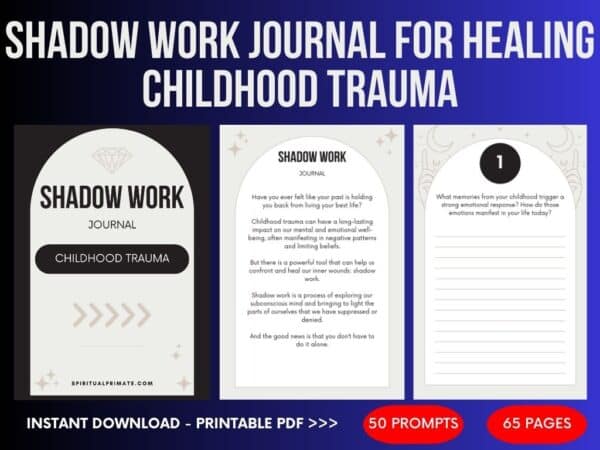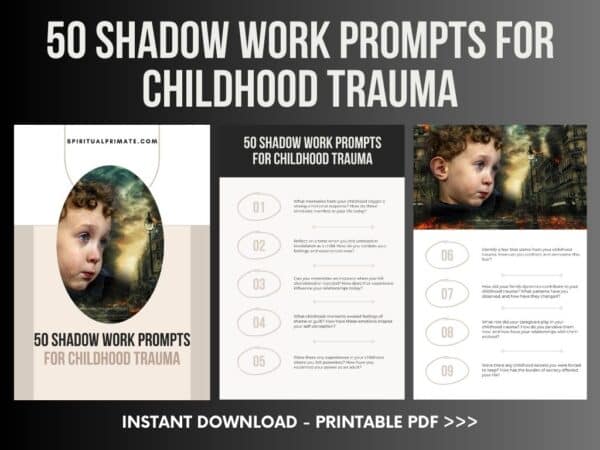Have you ever felt like your past is holding you back from living your best life?
Childhood trauma can have a long-lasting impact on our mental and emotional well-being, often manifesting in negative patterns and limiting beliefs.
But there is a powerful tool that can help us confront and heal our inner wounds: shadow work.
Shadow work is a process of exploring our subconscious mind and bringing to light the parts of ourselves that we have suppressed or denied.
And the good news is that you don’t have to do it alone.
In this article, we’ve compiled 50 powerful shadow work prompts to guide you on your healing journey.
From exploring your inner child to facing your fears and limiting beliefs, these prompts will help you identify and release the emotional baggage that is holding you back.
So, grab a pen and paper, and let’s dive into the transformative world of shadow work.
Unraveling the Mystery of Childhood Trauma
Once upon a time, in the magical land of our past, a young child roamed through life’s adventures with a heart full of dreams and a spirit of wanderlust. But like all great stories, there were dragons to face, storms to weather, and shadows lurking in the corners of our memories.
Welcome, dear reader, to the enigmatic world of childhood trauma.
You see, childhood trauma is a dark, mysterious force that can silently weave its way into our lives, leaving emotional scars that may stay with us for years, or even a lifetime. It’s like an invisible ink that colors our thoughts, feelings, and actions, often without us even realizing it.
In our journey through life, we may encounter various types of dragons: physical, emotional, or even psychological ones. These dragons, or traumatic events, can range from abuse, neglect, and loss, to bullying, accidents, and illness.
But fear not, for our young heroes are resilient! In fact, children possess an incredible ability to adapt and bounce back from challenges. However, sometimes the dragons are too fierce, and the child’s shield isn’t quite strong enough to deflect the flames. This is where the seeds of trauma begin to take root.
The impact of childhood trauma can manifest in many ways. It may hide beneath the surface, waiting to rear its head as anxiety, depression, or even physical ailments. It might disguise itself as relationship issues, low self-esteem, or an inexplicable sense of emptiness. And sometimes, it whispers to us through our dreams, urging us to embark on a quest of self-discovery and healing.
But fear not, dear reader, for there is hope! With the help of wise guides, enchanted tools, and a brave heart, one can embark on a journey of transformation and growth. By exploring the realm of our past, we can learn to understand and heal the wounds left by childhood trauma, ultimately emerging stronger, wiser, and more at peace with ourselves and the world around us.
So, gather your courage, and let us journey together to face the dragons of our past and unlock the magic within, for a brighter, more enchanted future awaits us all.
How Shadow Work Can Help Healing Childhood Trauma
Once upon a time, in the enchanted realm of the psyche, there was a magical land filled with memories, emotions, and experiences. This land was called “Childhood,” and it was a place where pure innocence and endless wonder danced together in harmony. However, lurking in the shadows of this beautiful land was a dark force known as “Trauma.” It would creep into the hearts and minds of the children, leaving deep and mysterious scars that would haunt them, even as they grew into adults.
Unbeknownst to the inhabitants of Childhood, there was a powerful and transformative practice that could help heal these emotional wounds. This ancient technique was known as “Shadow Work.” It was a sacred and mysterious art form, one that required great courage, vulnerability, and determination.
Shadow Work was the process of venturing into the deep, dark corners of the mind, where the shadows of past traumas resided. These shadows would often manifest as fears, insecurities, and limiting beliefs that held the person back from living their fullest, most vibrant lives.
The first step of Shadow Work involved acknowledging and embracing the existence of these shadows. The brave souls who dared to face their shadows would learn to listen to their whispers and understand the source of their pain. Through this process, they would begin to see how their past experiences had shaped their present reality.
Next, the courageous traveler would delve deeper into their shadowy realms, seeking to understand the reasons behind their traumatic experiences. They would learn to see the events of their past in a new light, reframing them as opportunities for growth and understanding. This process of re-evaluation would help them to make sense of their pain, allowing them to accept and forgive both themselves and others.
As the journey continued, the seeker would begin to experience a profound sense of compassion for their younger selves. They would come to realize that the child within was doing the best they could with the resources they had at the time. This newfound compassion would help to soothe the emotional wounds and release the grip of the dark force that had once held them captive.
Finally, the individual would learn to integrate their shadows into their present-day selves. They would come to accept the full spectrum of their emotions and experiences, understanding that both light and darkness were necessary for growth and transformation. By integrating their shadows, they would unlock the hidden gifts and talents that had been buried beneath years of pain and trauma.
And so, through the magical and transformative power of Shadow Work, the brave souls who embarked on this journey would find healing, self-love, and a renewed sense of purpose. They would emerge from the shadows, stronger and more resilient than ever before, ready to face the world with open hearts and open minds.
Thus, the once-dark and mysterious force of childhood trauma was transformed into a beacon of light, guiding others along the path of healing and self-discovery. In the enchanted realm of the psyche, the land of Childhood once again flourished, as the wise and courageous survivors of trauma danced together in harmony, their shadows now a beautiful and integral part of the tapestry of their lives.
Shadow Work Prompts for Childhood Trauma
1. What memories from your childhood trigger a strong emotional response? How do those emotions manifest in your life today?
2. Reflect on a time when you felt unheard or invalidated as a child. How do you validate your feelings and experiences now?
3. Can you remember an instance when you felt abandoned or rejected? How does that experience influence your relationships today?
4. What childhood moments evoked feelings of shame or guilt? How have these emotions shaped your self-perception?
5. Were there any experiences in your childhood where you felt powerless? How have you reclaimed your power as an adult?
6. Identify a fear that stems from your childhood trauma. How can you confront and overcome this fear?
7. How did your family dynamics contribute to your childhood trauma? What patterns have you observed, and how have they changed?
8. What role did your caregivers play in your childhood trauma? How do you perceive them now, and how have your relationships with them evolved?
9. Were there any childhood secrets you were forced to keep? How has the burden of secrecy affected your life?
10. How did your trauma shape your beliefs about love and trust? What steps can you take to rebuild trust in your relationships?
11. What coping mechanisms did you develop as a result of your childhood trauma? Are these coping mechanisms still helpful, or do they need to be replaced with healthier alternatives?
12. Can you recall a moment when you felt completely safe and protected? How can you recreate that sense of security in your life now?
13. What childhood dreams and aspirations were stifled by your trauma? How can you reconnect with those dreams and give them new life?
14. How has your childhood trauma influenced your self-worth? What steps can you take to embrace your inherent value and worthiness?
15. Reflect on a time when you felt helpless as a child. How can you empower yourself and others in similar situations?
16. What lessons did you learn from your childhood trauma? How have these lessons contributed to your growth and resilience?
17. Were there any supportive figures during your childhood? How did they help you navigate your trauma, and how can you honor their impact on your life?
18. How did your childhood trauma affect your education and learning experiences? What resources can you access now to further your personal growth and development?
19. How has your childhood trauma influenced your communication style? What steps can you take to improve your communication skills and express yourself authentically?
20. What childhood experiences led you to feel like an outsider or unwelcome? How can you cultivate a sense of belonging in your life now?
21. Identify a time when you felt betrayed or deceived as a child. How has this experience impacted your ability to trust others?
22. How did your childhood trauma inform your understanding of boundaries? What steps can you take to establish healthier boundaries in your relationships?
23. Were there any instances when you felt controlled or manipulated as a child? How have you learned to assert yourself and maintain your autonomy?
24. What expectations were placed on you as a child, and how have they influenced your sense of self and your life choices?
25. How has your childhood trauma shaped your relationship with your body? What steps can you take to nurture a healthy relationship with your physical self?
26. What childhood experiences left you feeling unworthy or unlovable? How can you cultivate self-love and acceptance in your life now?
27. How did your childhood trauma contribute to feelings of isolation or loneliness? What steps can you take to foster connection and community in your life?
28. Reflect on a time when you felt misunderstood or misjudged as a child. How can you cultivate empathy and understanding for yourself and others?
29. What childhood experiences led you to question your intuition or judgment? How can you strengthen your trust in your inner wisdom?
30. How has your childhood trauma influenced your sense of purpose or direction in life? What steps can you take to reconnect with your passions and purpose?
31. Were there any instances when you felt excessively responsible for others as a child? How do you balance responsibility and self-care in your life now?
32. How did your childhood trauma impact your spiritual beliefs or practices? How can you incorporate healing and growth into your spiritual journey?
33. What childhood experiences left you feeling unsafe or threatened? How can you create a sense of safety and security in your life now?
34. How did your childhood trauma affect your ability to express and process emotions? What steps can you take to develop emotional intelligence and resilience?
35. What childhood experiences contributed to your sense of vulnerability? How can you embrace vulnerability as a strength in your life now?
36. How has your childhood trauma shaped your relationship with money and material possessions? What steps can you take to establish financial well-being and abundance?
37. Reflect on a time when you felt judged or criticized as a child. How can you practice self-compassion and release judgment from your life?
38. What childhood experiences led you to feel unworthy of success or happiness? How can you cultivate a mindset of abundance and joy in your life now?
39. How did your childhood trauma impact your creativity and self-expression? What steps can you take to nurture your creative spirit now?
40. What childhood experiences contributed to feelings of anxiety or worry? How can you develop skills to manage and alleviate anxiety in your life?
41. How has your childhood trauma influenced your relationship with food and nourishment? What steps can you take to nurture a healthy relationship with food and your body?
42. What childhood experiences left you feeling invisible or overlooked? How can you honor and celebrate your unique gifts and talents in your life now?
43. How did your childhood trauma affect your sense of time and the future? What steps can you take to embrace the present moment and cultivate optimism for the future?
44. What childhood experiences led you to feel unsupported or unappreciated? How can you build a support system and surround yourself with encouragement and positivity?
45. How has your childhood trauma influenced your relationship with nature and the environment? What steps can you take to connect with and care for the natural world?
46. Reflect on a time when you felt silenced or dismissed as a child. How can you use your voice to advocate for yourself and others now?
47. What childhood experiences contributed to your understanding of gender and identity? How can you embrace and celebrate your authentic self in your life now?
48. How did your childhood trauma shape your views on forgiveness and reconciliation? What steps can you take to forgive and heal from past hurts?
49. What childhood experiences left you feeling uncertain or confused? How can you develop clarity and confidence in your decision-making process?
50. How has your childhood trauma impacted your capacity for joy and playfulness? What steps can you take to reclaim and celebrate these aspects of yourself in your life now?
In conclusion, shadow work is a powerful tool for healing childhood trauma and promoting personal growth.
By delving deep into our unconscious mind and exploring our shadow self, we can uncover hidden wounds and limiting beliefs that have been holding us back.
The prompts provided in this article are just a starting point and can be adapted to suit individual needs and experiences.
Remember that shadow work is a journey, and it can be challenging at times, but the rewards are immense.
With patience, self-compassion, and a willingness to confront our inner demons, we can emerge stronger, more resilient, and more aligned with our true selves.
Dive Deeper Into Your Shadow Work Journey
Don’t wait any longer to uncover the hidden treasures within you. Download your Shadow Work Journal now and take the first step towards a more empowered and self-aware future.
- Product on sale
 Printable Shadow Work Journal for Healing Childhood Trauma [PDF]Original price was: $11.98.$5.99Current price is: $5.99.
Printable Shadow Work Journal for Healing Childhood Trauma [PDF]Original price was: $11.98.$5.99Current price is: $5.99. - Product on sale
 50 Shadow Work Prompts for Childhood Trauma | Printable PDFOriginal price was: $5.98.$2.99Current price is: $2.99.
50 Shadow Work Prompts for Childhood Trauma | Printable PDFOriginal price was: $5.98.$2.99Current price is: $2.99.

